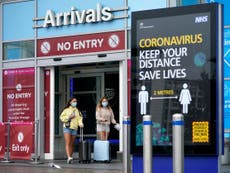Spain quarantine: After the Balearics and Canaries were added to the no-go list, what are travellers’ options?
Foreign Office now warns against travel to Mallorca, Ibiza, Gran Canaria, Tenerife and other Spanish islands

Around 500,000 British holidaymakers are believed to be in Spain.
A further 1.6 million people are estimated to be booked to travel from the UK to Spain in the next month alone; it is by far the most popular destination for British holidaymakers.
These are the implications for their trips.
What has happened?
On 25 July, the government warned against all non-essential travel to mainland Spain. It was in response to several spikes of coronavirus infection in the northeastern provinces of Aragon, Navarra and Catalonia.
Less than 48 hours later, the Foreign Office also advised against all non-essential travel to the Balearic and Canary Islands.
The FCO now deems all of Spain to constitute “an unacceptably high risk for British travellers”.
In addition, all holidaymakers returning to the UK must self-isolate at home for 14 days, following the date of their arrival.
They can leave home only for medical assistance, to attend court or a funeral, to go shopping for essentials if there is no one else who can supply provisions, or to leave the country again.
Leaving the dwelling for work, exercise, socialising or walking the dog is not permitted.
What is the effect of the travel advice?
Standard travel insurance policies are invalidated if you visit a country against Foreign Office travel advice. In addition, travel firms do not send package holidaymakers to such destinations – though flights are continuing.
If I am in Spain, must I leave?
No. British holidaymakers in Spain are not being advised to return home. Their insurance cover will remain in place.
Some may choose to leave early in order to start – and therefore finish – quarantine earlier. If they decide to do this, they will need to arrange flights at extra cost. Insurance is unlikely to cover them.
I have a holiday booked there later this week. What are my options?
That depends on the exact type of holiday. The mainstream operators – notably the giants, Tui and Jet2 – will not send holidaymakers to destinations against government advice without offering instead a full refund or an alternative holiday.
Tui has cancelled all its trips to the islands up to and including 31 July, and mainland holidays to 9 August. Jet2 has cancelled flights and holidays to the islands up to 9 August, and to mainland destinations up to and including 16 August.
“For customers who are due to travel to these destinations after the dates given above, we will provide an additional update once we receive more information from the government,” said a Jet2 spokesperson.
“What we need now is clarity and consistency from the government. We understand that this is a fast-moving situation, however the information we are receiving is contradictory and often comes with little or no notice.”
In theory you should get your money back within two weeks, but that time limit is highly unlikely to be met given the extreme stress on the travel industry caused by the coronavirus pandemic.
I booked through an online travel agent, which says I can’t have a refund for flights if they go ahead. Is that correct?
Package holidays arranged by online travel agents such as Love Holidays, On The Beach and Travel Republic typically include flights on easyJet or Ryanair and separately sourced accommodation.
These trips are covered by the Package Travel Regulations 2018, which say you can get a full refund “in the event of unavoidable and extraordinary circumstances occurring at the place of destination or its immediate vicinity and which significantly affect (a) the performance of the package, or (b) the carriage of passengers to the destination”.
The traveller in search of a refund will contend that the sudden imposition of Foreign Office advice against travel to Spain because of the “unacceptably high risk” for British travellers constitutes “unavoidable and extraordinary circumstances” – and that it will significantly affect the performance of the package,” because travel insurance will be invalidated and the traveller would need to quarantine on return.
Abta, the travel association, says: “The new regulations give customers the right to cancel where the incident significantly affects the performance of your holiday, so you can cancel your package holiday and receive a refund.
“Such situations will usually arise where the Foreign and Commonwealth Office (FCO) issues advice against travel to the destination.”
So even if your scheduled flight on Ryanair or easyJet is going ahead, if you are on a package – and have an Atol certificate to confirm it – then you should be entitled to a refund.
But you should make every effort to contact the travel company to confirm this. Some, including On the Beach, argue that they are able to carry passengers to the destination, and the accommodation (or a suitable alternative) can be provided, so the package can still be provided without its performance being significantly affected.
On the Beach says: “FCO advice against all but essential travel has previously meant that there is a clear and present threat to life resulting in a total shutdown of that destination and all flights to that destination.
“If this were the case currently with your destination, then flights from the UK would not remain operational in the volumes that they are.”
The Independent is seeking urgent clarification about the legal situation.
I have a package holiday booked for later in August. Do I get a refund?
Not automatically, because no one knows how long the advice will be in place. There are likely to be staggered cancellations.
The most stylish reusable face masks to buy now
Show all 30I booked flight-only. What are my rights?
You have far less protection. Despite the sudden government decision, many flights are still operating. If the departure goes ahead as planned, the airline is legally entitled to refuse a refund.
However, easyJet has said that it will offer options to passengers booked to Spain in the near future, enabling them to switch journeys or take a voucher.
The airline said: “We are monitoring the situation and continue to provide some flexibility for those who, if they no longer wish to travel, can transfer flights without a change fee or receive a voucher for the value of their booking.”
British Airways said: “Customers who decide they no longer wish to travel are able to claim a voucher for future travel.”
But a Ryanair spokesperson told The Independent: “For non-cancelled flights, standard T&Cs apply. Passengers who do not wish to travel on their booked flight can move it to another date, in which case, a flight change fee and the difference in fare may apply.”
While new Ryanair bookings until September offer no flight-change fee flexibility, for tickets bought earlier the cost is £35 to £95 per flight – plus any increase in fare compared with the original.
Will travel insurance help?
Possibly, if you took out a policy before mid-March (when the coronavirus crisis took hold and became a “known risk”) and it covers disruption caused by a change in Foreign Office advice. Otherwise it is unlikely you will get any recompense.
Subscribe to Independent Premium to bookmark this article
Want to bookmark your favourite articles and stories to read or reference later? Start your Independent Premium subscription today.






Join our commenting forum
Join thought-provoking conversations, follow other Independent readers and see their replies
Comments